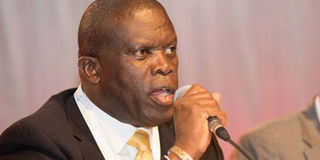DFID gives 17 million pounds to Financial Sector Deepening Uganda

The minister of state for trade, Mr Michael Werikhe. Mr Werikhe said in Uganda today, 15 percent of adult population is financially excluded. FILE PHOTO
What you need to know:
- The minister of state for trade, Mr Michael Werikhe said in Uganda today, 15 percent of adult population is financially excluded, 80 percent of Ugandans do not have bank accounts, only 2 percent of Ugandans are insured and the gross domestic savings (percentage of GDP) in Uganda was reported at 13.28 percent in 2015.
- The executive director of Financial Sector Deepening Uganda, Ms Jacqueline Musiitwa said financial services companies should compete with telecommunications companies and financial technology companies so that they are pushed to provide a diverse array of services at the best prices for customers with consumer protection principles embedded.
KAMPALA
The Department for International Development (DFID) has provided 17 million British Pounds (about Shs82.546 billion) to Financial Sector Deepening Uganda (FSDU) to support financial institutions develop new products, so the general public can have increased access to financial services to eradicate poverty.
The money is to help FSDU conduct research needed by banks to provide financial services to the general public who are still excluded in the financial services.
The fund helps FSDU to conduct financial education so that they can understand different financial products in the market.
Speaking at a symposium on Financial Inclusion on Tuesday at Kampala Serena Hotel, Mr Adrian Green, the head of Growth and Economic Management at Department for International Development, said the UK taxpayer is one of the key donors funding Financial Sector development worldwide and the Financial Sector Deepening network across central and southern Africa aiming to promote inclusive financial services. He added that FSD Uganda is part of the FSD network supported by DFIDs private sector department in the UK.
“The financial system is a key piece of economic infrastructure, with a vital role to play in boosting trade, investment, and an exit from aid for developing countries; and in alleviating poverty. And making the financial sector accessible, used by all, accountable to all is critical to alleviating poverty at the household and community level,” he said.
Mr Adrian explained that financial markets are simply a key economic enabler and there is evidence that financial sector development drives economic growth.
According to him, there is a clear link between deeper financial development and faster growth in sub-Saharan Africa in particular.
“Access to financial services reduces poverty at the individual, household, business and the community level by allowing people to manage their economic lives more effectively and by making them less vulnerable to shocks,” he said.
Adding: “That is why the UK is committed to the FSD network and why we have renewed our commitment, and now with a commitment to partner from the Bill and Melinda Gates Foundation, to fund FSD Uganda vital work.
When Daily Monitor asked Mr Adrian how much Bill and Melinda Gates Foundation is willing to give to FSDU, he said “They have shown indicative willingness of providing $7.5 million (about Shs27.389 billion).”
The executive director of Financial Sector Deepening Uganda, Ms Jacqueline Musiitwa said financial services companies should compete with telecommunications companies and financial technology companies so that they are pushed to provide a diverse array of services at the best prices for customers with consumer protection principles embedded.
The minister of state for trade, Mr Michael Werikhe said in Uganda today, 15 percent of adult population is financially excluded, 80 percent of Ugandans do not have bank accounts, only 2 percent of Ugandans are insured and the gross domestic savings (percentage of GDP) in Uganda was reported at 13.28 percent in 2015.
“With these kind of statistics, our aspirations to achieve the middle income status are threatened; because it is globally acknowledged that financial inclusion is a fundamental ingredient of growth and development,” he said.
However, Mr Werikhe expressed optimism saying in recent years, technological innovations like Mobile Money services have provided unprecedented opportunities to the advancement of financial inclusion. He said that data captured in mobile money services can be useful in generating information on consumers which can be used to design and deliver appropriate financial services that meet the consumer needs and are viable for financial service providers.
“The Financial Institution (amendment) Bill 2015 that introduced three new products to Uganda’s banking sector: Islamic banking; Bancassurance and agent banking, will go a long way in supporting the drive towards financial inclusion. We hope agent banking, which eliminates the need for heavy investment in the physical and ICT infrastructure, will help in lowering of interest rates,” he said.




